The World Organisation for Animal Health (WOAH), formerly the Office International des Epizooties (OIE), is an intergovernmental organisation founded in 1924, coordinating, supporting and promoting animal disease control. The primary objective of WOAH is to control epizootic diseases and prevent their spread. Further objectives include the sharing of transparent, scientific information; international solidarity; sanitary safety; and the promotion of veterinary services‚ food safety and animal welfare.

A veterinarian (vet) or veterinary surgeon is a medical professional who practices veterinary medicine. They manage a wide range of health conditions and injuries in non-human animals. Along with this, veterinarians also play a role in animal reproduction, health management, conservation, husbandry and breeding and preventive medicine like nutrition, vaccination and parasitic control as well as biosecurity and zoonotic disease surveillance and prevention.

The Department for Environment, Food and Rural Affairs (Defra) is a ministerial department of the Government of the United Kingdom. It is responsible for environmental protection, food production and standards, agriculture, fisheries and rural communities in the entire United Kingdom. Concordats set out agreed frameworks for cooperation, between it and the Scottish Government, Welsh Government and Northern Ireland Executive, which have devolved responsibilities for these matters in their respective nations.
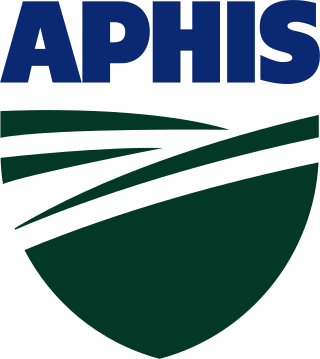
The Animal and Plant Health Inspection Service (APHIS) is an agency of the United States Department of Agriculture (USDA) based in Riverdale, Maryland responsible for protecting animal health, animal welfare, and plant health. APHIS is the lead agency for collaboration with other agencies to protect U.S. agriculture from invasive pests and diseases. APHIS's PPQ is the National Plant Protection Organization for the U.S., and the agency's head of veterinary services/veterinary Deputy Administrator is the Chief Veterinary Officer of the United States.
The Canadian Food Inspection Agency is a regulatory agency that is dedicated to the safeguarding of food, plants, and animals (FPA) in Canada, thus enhancing the health and well-being of Canada's people, environment and economy. The agency is responsible to the Minister of Health.
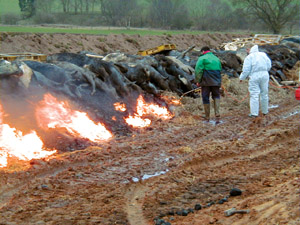
The outbreak of foot-and-mouth disease in the United Kingdom in 2001 caused a crisis in British agriculture and tourism. This epizootic saw 2,000 cases of the disease on farms across most of the British countryside. Over 6 million cows and sheep were slaughtered on farms in an eventually successful attempt to halt the disease. Cumbria was the worst affected area of the country, with 893 cases.

The Pirbright Institute is a research institute in Surrey, England, dedicated to the study of infectious diseases of farm animals. It forms part of the UK government's Biotechnology and Biological Sciences Research Council (BBSRC). The institute employs scientists, vets, PhD students, and operations staff.

Texas A&M Veterinary Medical Diagnostic Laboratory (TVMDL) is an integral part of the Texas A&M University System. It consists of four lab locations spread across Texas; two full-service laboratories located in Canyon and College Station and two poultry laboratories in Center and Gonzales.
The Veterinary Laboratories Agency (VLA) was an executive agency of the UK government's Department for Environment, Food and Rural Affairs (DEFRA). It carried out animal disease surveillance, diagnostic services and veterinary scientific research for government and commercial organisations. It was based in New Haw, though had offices and laboratories around the country, such as in Sutton Bonington.
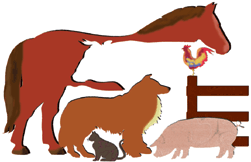
The Center for Veterinary Medicine (CVM) is a branch of the U.S. Food and Drug Administration (FDA) that regulates the manufacture and distribution of food, food additives, and drugs that will be given to animals. These include animals from which human foods are derived, as well as food additives and drugs for pets or companion animals. CVM is responsible for regulating drugs, devices, and food additives given to, or used on, over one hundred million companion animals, plus millions of poultry, cattle, swine, and minor animal species. Minor animal species include animals other than cattle, swine, chickens, turkeys, horses, dogs, and cats.
A food safety agency or food administration or Food Safety Authority is a government agency responsible for ensuring the safety, quality, and proper labeling of food products within a country or region. These agencies play a crucial role in protecting public health by establishing and enforcing regulations and standards to ensure that food produced, imported, processed, distributed, and sold is safe for consumption.
The State Veterinary Service (SVS) was, from 1938 to 2007, an executive agency of the Department for Environment, Food and Rural Affairs (Defra), a department of the Government of the United Kingdom. It was the government's delivery agent, responsible for animal health and welfare in England, Scotland and Wales.
North Carolina State University College of Veterinary Medicine is an American educational institution located in Raleigh, North Carolina that offers master's and doctorate-level degree programs; interdisciplinary research in a range of veterinary and comparative medicine topics through centers, institutes, programs and laboratories; and external engagement through public service programs and activities.
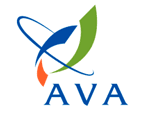
The Agri-Food and Veterinary Authority of Singapore (AVA) was a statutory board under the Ministry of National Development that regulated food safety, safeguarded animal and plant health, and facilitated the agri-food and fisheries trade sectors. AVA was disbanded on 1 April 2019, with duties being transferred to other statutory boards, Singapore Food Agency, National Environment Agency, Health Sciences Authority, and National Parks Board.
The National Bee Unit (NBU) runs Bee Health Programmes in England and Wales. The NBU consists of around 60 field-based Bee Inspectors and staff based in Sand Hutton, North Yorkshire.
Biosecurity in the United States is governed by the Bureau of Western Hemisphere Affairs, which is part of the US Department of State. It obtains guidance and advice on specific matters relating to biosecurity from various other government agencies.
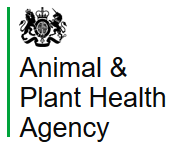
The Animal and Plant Health Agency (APHA), formerly known as the Animal Health and Veterinary Laboratories Agency (AHVLA), is an executive agency of the Department for Environment, Food and Rural Affairs (Defra) of the United Kingdom.
The Moredun Research Institute is a scientific research institution based at the Pentlands Science Park, in the Bush Estate area of Midlothian, Scotland. It conducts research into diseases of farm livestock and the promotion of animal health and welfare.
The National Centre for Foreign Animal Disease (NCFAD), located in the Canadian Science Centre for Human and Animal Health in Winnipeg, Manitoba, is part of the Canadian Food Inspection Agency’s National Centres for Animal Disease. NCFAD is co-located with the Public Health Agency of Canada’s National Microbiology Laboratory.

Antibiotic use in livestock is the use of antibiotics for any purpose in the husbandry of livestock, which includes treatment when ill (therapeutic), treatment of a group of animals when at least one is diagnosed with clinical infection (metaphylaxis), and preventative treatment (prophylaxis). Antibiotics are an important tool to treat animal as well as human disease, safeguard animal health and welfare, and support food safety. However, used irresponsibly, this may lead to antibiotic resistance which may impact human, animal and environmental health.










